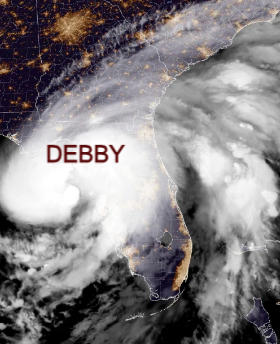Impact of Natural Disasters on Employers
- Sep 28, 2022
- 3 min read
Updated: Aug 5, 2024

As tropical storms often threaten turn into hurricanes and cause destruction throughout Florida, here are a few reminders employers should take into consideration.
There are nuances to managing employees during a crisis that span from compensation rules, accommodating for immediate military leave, and communication needs with nationwide remote workers. More important than addressing the unique circumstances that occur during natural disasters, you want to ensure that working conditions and demands will not jeopardize the health and wellness of any of your employees.
Health & Safety
First, prioritize the health and safety of your employees. Some companies continue to operate through the storm because of the nature of their business. Keep in mind that the safety of the employees is paramount. This should continue to be the number one priority for everyone. Even first responders don’t respond during the height of the storm. They wait until it is safe enough to conduct a rescue without putting more lives at unnecessary risk.
In addition, employers should reach out to their employees after the storm and provide support during the clean-up and recovery process. This support could include additional time off, financial assistance, or other direct help to get them back on their feet. I am always amazed at how people come together after a disaster.
Compensation
I frequently receive a number of questions about how to pay employees in the event the company shuts down or during the recovery period.
Non-exempt Employees
Non-exempt employees must be paid for all hours worked, whether in the office or at home. If your office or worksite must close, but your employees still have the ability to work from home, they can complete their hours there, however just because you can ask them to do this doesn’t mean you should. If no work is performed non-exempt employees do not need to be paid.
That said, many companies offer PTO, or some other benefit during the time. This is not normally considered hours worked, so if the company does offer this pay benefit, it will not count toward overtime.
Exempt Employees
Exempt employees need to be paid for the entire week any time they did any work. A company shutting down, even for a hurricane, must still pay exempt employees if they worked during that week. The normal rules under the Fair Labor Standards Act still apply. This time can be taken from a bona fide PTO or other leave policy. That said, should a company be closed for an extended period of time, and an exempt employee doesn’t work during an entire workweek, no compensation is due.
Keep in mind however, that working from home, making calls, answering emails is considered work.
Military Leave (USERRA)
During natural disasters, members of the Armed Forces, including Reserves and National Guard, may be called up to assist with rescue and recovery efforts. The governor often calls Florida Guardsmen to active duty in response to a tropical storm or hurricane.
The Uniformed Services Employment and Reemployment Rights Act provides specific job protections for employees in the Armed Forces, including the National Guard. Should an employee be called to duty, ensure you understand the responsibilities of the employer and the rights of the employee.
Remote Workers
Remote workers have become more common throughout the country. There are times when a disaster impacts one or more employees of a company who reside on the other side of the country. It is critical that employers still respond to these off-site employees.
Employers should take into consideration the different local impacts on their remote workers. Asking them to continue to work during the middle of a storm or when they should be making preparations ahead of the weather can put them at risk. You run the risk of alienating not only that impacted employees, but the rest of the staff as well.
Your business will be better able to sustain losses and limit the aftermath when employees are healthy and safe. This can enable them to safely return to their work routines when the storm, so to speak, blows over. In a way, you are their advocate, providing accommodations designed to help maintain the safety of each employee and the greater communities we live in.
Natural disasters can have far-reaching consequences and impact not just local employees. Communication before, during, and after a storm is critical. Employers have an opportunity to strengthen their relationship with their workers. However, they also have an opportunity to drop the ball. Think through your actions, and when in doubt . . . ask.
We are here for you.






